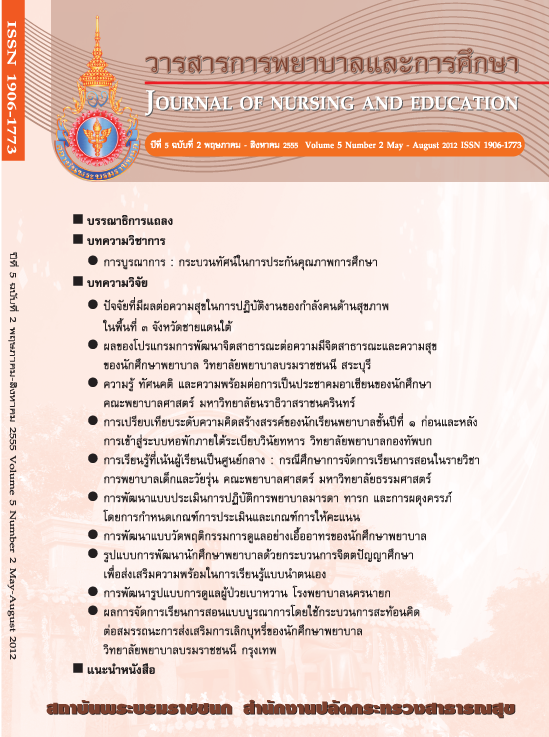การพัฒนารูปแบบการดูแลผู้ป่วยเบาหวาน โรงพยาบาลนครนายก
คำสำคัญ:
participated action research, A diabetic Caring Model, Diabetic Patient, Diabetic campบทคัดย่อ
บทคัดย่อ
การวิจัยเชิงปฏิบัติการแบบมีส่วนร่วมนี้มีวัตถุประสงค์เพื่อพัฒนารูปแบบการดูแลผู้ป่วยเบาหวาน โรงพยาบาลนครนายก ดำเนินการวิจัยระหว่างเดือนตุลาคม 2552 ถึง เดือน ตุลาคม 2554
การวิจัยแบ่งเป็น 3 ระยะ ได้แก่ 1) ระยะก่อนการพัฒนารูปแบบการดูแลผู้ป่วยเบาหวาน โดยการ ทบทวนวรรณกรรม การสังเกต การสนทนากลุ่มและการสัมภาษณ์เชิงลึก 2) ระยะการพัฒนารูปแบบการดูแล ผู้ป่วยเบาหวาน แบ่งเป็นการพัฒนาศักยภาพบุคลากรสาธารณสุขโดยการจัดค่ายเบาหวาน โดยศึกษา ในพยาบาลวิชาชีพที่ดูแลผู้ป่วยเบาหวาน จำนวน 40 คน วิเคราะห์ข้อมูลด้วยสถิติร้อยละและการพัฒนา ศักยภาพการผู้ป่วยเบาหวานแผนกผู้ป่วยนอกและผู้ป่วยใน โดยการเสริมสร้างพลังอำนาจ โดยการใช้ กระบวนการกลุ่ม โดยศึกษาในผู้ป่วยเบาหวานที่มีภาวะน้ำตาลในเลือดสูงแผนกผู้ป่วยนอกจำนวน 60 คน วิเคราะห์ข้อมูลด้วยสถิติ t- test และผู้ป่วยเบาหวานที่มีภาวะน้ำตาลในเลือดสูงแผนกผู้ป่วยในจำนวน 10 คน วิเคราะห์ข้อมูลด้วยสถิติร้อยละและ 3) ระยะประเมินผลการนำรูปแบบการดูแลผู้ป่วยไปใช้ และข้อมูล เชิงคุณภาพด้วยวิธีวิเคราะห์เนื้อหา
ผลการวิจัย 1)จากสถานการณ์การดูแลผู้ป่วยเบาหวาน พบว่า บุคลากรยังมีความรู้ในการดูแลผู้ป่วย ไม่เพียงพอ ยังไม่มีรูปแบบในการให้ข้อมูลเกี่ยวกับโรคและการดูแลตนเองของผู้ป่วยที่ชัดเจน จึงมีการพัฒนารูปแบบในการดูแลผู้ป่วยเบาหวาน ซึ่งประกอบด้วยการพัฒนาศักยภาพบุคลากร โดยการจัด ค่ายเบาหวานและการพัฒนาศักยภาพผู้ป่วยเบาหวานแผนกผู้ป่วยนอกและผู้ป่วยใน โดยการเสริมสร้าง พลังอำนาจโดยการใช้กระบวนการกลุ่ม ผลการวิจัยพบว่าพยาบาลวิชาชีพมีความรู้และความพึงพอใจ ในการจัดค่ายเบาหวานในระดับสูง ส่วนการเสริมสร้างพลังอำนาจผู้ป่วยเบาหวานแผนกผู้ป่วยนอก โดยใช้ กระบวนการกลุ่ม พบว่า ผู้ป่วยมีความรู้และพฤติกรรมการดูแลตนเองอย่างมีนัยสำคัญทางสถิติที่ระดับ .05 และมีระดับน้ำตาลในเลือดอย่างไม่มีนัยสำคัญทางสถิติที่ระดับ .05 สำหรับการเสริมสร้างพลังอำนาจ ผู้ป่วยเบาหวานแผนกผู้ป่วยใน โดยใช้กระบวนการกลุ่ม พบว่า ผู้ป่วยมีความรู้และพฤติกรรมการดูแลตนเอง สูง กว่าก่อนการทดลองและมีระดับน้ำตาลในเลือดต่ำกว่าก่อนทดลอง จากการสัมภาษณ์เชิงลึก พบว่าผู้ใช้ บริการและผู้ให้บริการมีความพึงพอใจในรูปแบบการดูแลผู้ป่วยในระดับมาก
ผลการวิจัยแสดงให้เห็นว่ารูปแบบการดูแลผู้ป่วยเบาหวาน ช่วยให้เกิดระบบการดูแล ที่เหมาะสม กับผู้ป่วยโดยรวมและเพิ่มประสิทธิภาพในการดูแลตนเองของผู้ป่วย ผู้ให้บริการ เกิดแนวทางการปฏิบัติ ที่ชัดเจนและเกิดเครือข่ายความร่วมมือในการดูแลผู้ป่วยอย่างต่อเนื่อง
Abstract
The purpose of this participated action research was to develop a diabetic caring model in Nakhon Nayok Hospital during October 2552 to October 2554. The research process was divided into three phases. Phase1 :a situation analysis which analyzed the situation before developing the caring system for diabetic patients by literature revises observation, in – depth interview and focus group. Phase 2: a system development by developing public health personnel ability offering diabetic camp, studied in 40 nursing professional and using empowerment in group process of out - patient department (OPD) and in – patient department (IPD), studied in 30 diabetic patients in control group and 30 diabetic patients in experimental group in OPD, studied in 10 diabetic patients in OPD. Phase 3: a model evaluation using the diabetic caring model The data were collected through the knowledge, self - care behaviors and fasting blood glucose; knowledge, self - care behaviors questionnaire were designed by Amornrat Prasertthaicharoen. The statistical devices used in data analysis were frequencies, percentage, means, standard deviations, t – test and content analysis.
The research results were 1.from diabetic patient care situations found that personnel didn’t have enough knowledge to take care of the patients. There was no pattern to provide data about the disease and self – care behaviors. Therefore; developing the Diabetic Caring Model ,include nursing professional development by diabetic camp and using empowerment in group process in diabetic patient in OPD and IPD. The research found that nursing knowledge and satisfaction in diabetic camp were high. Moreover, using empowerment in group process in OPD found that patient knowledge and self – care behaviors were higher than before the trial, and higher than the control group at .05 significant statistical level. Fasting Blood sugar was lower than before the trial and less than the group control which didn’t have .05 significant statistical level. Using empowerment in group process in IPD found that knowledge, self – care behaviors and blood sugar after the trial was higher than before the trial. and Fasting Blood Sugar after the trial was lower than before the trial. From in – depth interview found that both the service user and the service providers were satisfied with the Diabetic Caring Model
The result of the research showed that a diabetic caring model enhance the appropriate care system and the self-care behaviors. The service provider has an explicit operating guideline and network to take care of the patients continuously.






